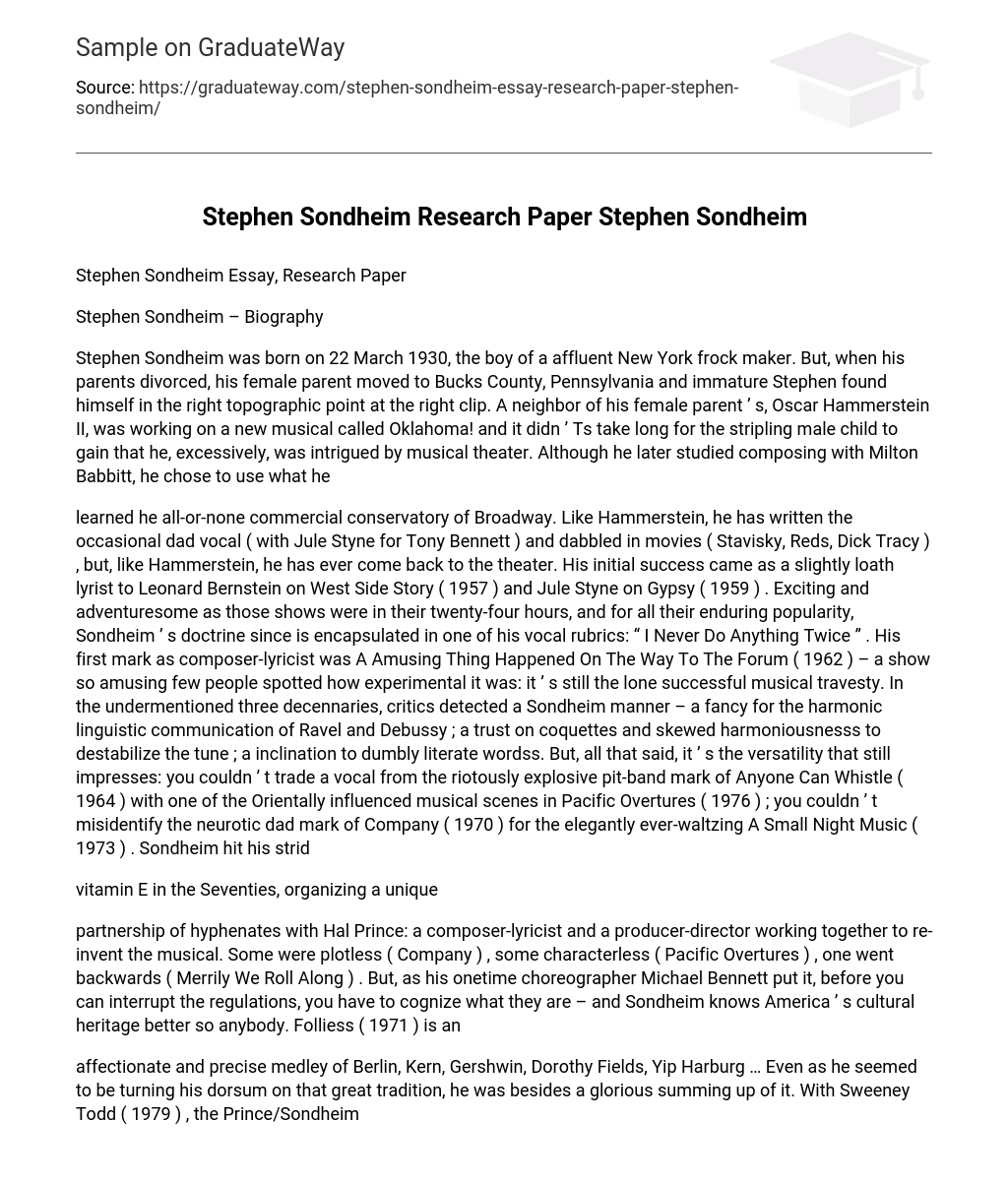Stephen Sondheim was born on 22 March 1930, the boy of a affluent New York frock maker. But, when his parents divorced, his female parent moved to Bucks County, Pennsylvania and immature Stephen found himself in the right topographic point at the right clip. A neighbor of his female parent ’ s, Oscar Hammerstein II, was working on a new musical called Oklahoma! and it didn ’ Ts take long for the stripling male child to gain that he, excessively, was intrigued by musical theater. Although he later studied composing with Milton Babbitt, he chose to use what he
learned he all-or-none commercial conservatory of Broadway. Like Hammerstein, he has written the occasional dad vocal ( with Jule Styne for Tony Bennett ) and dabbled in movies ( Stavisky, Reds, Dick Tracy ) , but, like Hammerstein, he has ever come back to the theater. His initial success came as a slightly loath lyrist to Leonard Bernstein on West Side Story ( 1957 ) and Jule Styne on Gypsy ( 1959 ) .
Exciting and adventuresome as those shows were in their twenty-four hours, and for all their enduring popularity, Sondheim ’ s doctrine since is encapsulated in one of his vocal rubrics: “ I Never Do Anything Twice ” . His first mark as composer-lyricist was A Amusing Thing Happened On The Way To The Forum ( 1962 ) – a show so amusing few people spotted how experimental it was: it ’ s still the lone successful musical travesty.
In the undermentioned three decennaries, critics detected a Sondheim manner – a fancy for the harmonic linguistic communication of Ravel and Debussy ; a trust on coquettes and skewed harmoniousnesss to destabilize the tune ; a inclination to dumbly literate wordss. But, all that said, it ’ s the versatility that still impresses: you couldn ’ t trade a vocal from the riotously explosive pit-band mark of Anyone Can Whistle ( 1964 ) with one of the Orientally influenced musical scenes in Pacific Overtures ( 1976 ) ; you couldn ’ t misidentify the neurotic dad mark of Company ( 1970 ) for the elegantly ever-waltzing A Small Night Music ( 1973 ) .
Sondheim hit his strid vitamin E in the Seventies, organizing a unique partnership of hyphenates with Hal Prince: a composer-lyricist and a producer-director working together to re-invent the musical. Some were plotless ( Company ) , some characterless ( Pacific Overtures ) , one went backwards ( Merrily We Roll Along ) . But, as his onetime choreographer Michael Bennett put it, before you can interrupt the regulations, you have to cognize what they are – and Sondheim knows America ’ s cultural heritage better so anybody.
Folliess ( 1971 ) is an affectionate and precise medley of Berlin, Kern, Gershwin, Dorothy Fields, Yip Harburg … Even as he seemed to be turning his dorsum on that great tradition, he was besides a glorious summing up of it. With Sweeney Todd ( 1979 ) , the Prince/Sondheim coaction reached its culmination, film overing the differentiations between wordss and duologue, vocals and underscoring, and uniting a complex secret plan with operatic emotions to make a alone musical thriller. But their following show, Merrily We Roll Along ( 1981 ) , flopped, and the two work forces went their separate ways.
Sondheim turned to the writer and manager James Lapine for Sunday In The Park With George ( 1984 ) , a work that seemed at times an autobiographical contemplation on the jobs of doing art in a commercial environment. His most recent shows illustrate one of his greatest strengths, his ability to compose against audience outlooks of the topic: for Into The Woods ( 1987 ) , he gave such familiar baby’s room figures as Cinderella and Red Riding Hood composite extended Numberss ; for the eponymic anti-heroes of Assassins ( 1990 ) , he wrote some of his most affecting, straightforward music, making back beyond Berlin to barbershop and Stephen Foster, and about to our ain clip with an dry lampoon of the Carpenters.
Not everyone feels comfy watching Lee Harvey Oswald singing along with John Wilkes Booth, but, in stretching the possibilities of the musical, Sondheim is seeking to turn out that the signifier has merely as broad a scope as the consecutive drama. And for that we should all be thankful.





